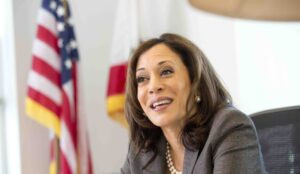When exploring the educational background of prominent figures like Vice President Kamala Harris, a common question arises: “Where Did Kamala Harris Go To Law School?” The answer, while seemingly straightforward, carries a layer of historical context. Kamala Harris attended and graduated from the University of California, Hastings College of the Law in 1989. However, the institution has since undergone a name change, now known as UC College of the Law, San Francisco, or UC Law SF. This name evolution reflects the enduring legacy of a law school with a rich history, far beyond its connection to the Vice President.
To truly understand the significance of Kamala Harris’s legal education, it’s essential to delve into the history and impact of UC Law SF. Here are 10 key aspects that highlight why this institution is not only where Kamala Harris honed her legal skills but also a landmark in American legal education:
1. A Legacy Spanning Nearly 150 Years: Established in 1878, UC Law SF holds the distinction of being the first law school founded west of the Rocky Mountains. This pioneering spirit is embedded in the institution’s DNA, marking it as a cornerstone of legal education in the Western United States.
2. Breaking Barriers and Paving the Way: UC Law SF is the alma mater of Emma Ping Lum, a graduate from the class of 1947. She shattered racial and gender barriers to become the first Chinese American woman to practice law in the U.S. Her remarkable career included arguing cases before the U.S. Supreme Court, showcasing the school’s commitment to fostering diverse legal talent.
3. Home to Legal Pioneers in Civil Rights: Wiley W. Manuel, a 1953 JD recipient from UC Law SF, achieved a historic milestone as the first African American Justice to serve on the California Supreme Court. His career exemplifies the law school’s role in cultivating leaders who champion justice and equality.
4. Nurturing Legal Giants and Industry Leaders: Alexander Francis Morrison, an 1881 graduate, co-founded Morrison & Foerster, which grew into one of the nation’s largest and most influential law firms. His success story underscores UC Law SF’s ability to produce graduates who shape the legal landscape and drive the legal industry forward.
5. Championing Diversity and Inclusion from the Outset: Christine la Barraque, an 1899 UC Law SF alumna, defied societal norms by becoming the first blind woman licensed to practice law in California. While she later transitioned to a career in music and disability advocacy, her legal achievement remains a testament to the school’s early embrace of inclusivity.
6. A Profound Impact on the Judiciary: The influence of UC Law SF extends deeply into the American judicial system. Over 500 living alumni currently serve or have served as judges at various levels, from state courts to federal benches across the nation. This extensive judicial network highlights the school’s vital role in shaping the judiciary.
7. The “65 Club” and a Haven for Legal Luminaries: In a unique chapter of its history, UC Law SF became a haven for legal academia’s brightest minds. From the 1940s to the 1980s, the college strategically hired 29 former law school deans and other distinguished professors who had been forced into retirement at age 65 from other institutions. This “65 Club” enriched the faculty with unparalleled experience and expertise.
8. Strategically Positioned in the Heart of Legal San Francisco: UC Law SF’s location is undeniably advantageous. Situated within blocks of crucial legal institutions, including the U.S. Ninth Circuit Court of Appeals, the California Supreme Court, and various federal and local courts, the school offers students unparalleled access to the practical workings of the legal system.
9. Emphasis on Practical Legal Skills through Clinics: UC Law SF distinguishes itself with its robust clinical programs. Offering 17 clinics, the college provides law students with hands-on experience representing diverse clients, from asylum seekers to low-income families, thereby fostering practical legal skills and a commitment to public service.
10. At the Forefront of Law and Innovation: UC Law SF is committed to preparing students for the evolving legal landscape. Through initiatives like the Startup Legal Garage, LexLab, and the Corporate Counsel Externship Program, the college provides students with unique opportunities to engage with cutting-edge technology and biotech sectors, ensuring they are ready for the intersection of law and innovation.
 Vice President Kamala Harris at UC Law SF
Vice President Kamala Harris at UC Law SF
In conclusion, when considering “where did Kamala Harris go to law school,” the answer is UC Law San Francisco, formerly UC Hastings. However, more importantly, understanding where Kamala Harris went to law school means recognizing the legacy of UC Law SF itself – an institution that has consistently broken barriers, fostered legal pioneers, and remained at the forefront of legal education for nearly 150 years. It’s a law school with a story that extends far beyond any single individual, yet one that has profoundly shaped the careers of countless legal professionals, including the Vice President of the United States.

